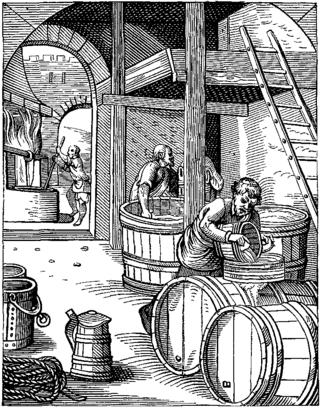
Brewing is the production of beer by steeping a starch source in water and fermenting the resulting sweet liquid with yeast. It may be done in a brewery by a commercial brewer, at home by a homebrewer, or communally. Brewing has taken place since around the 6th millennium BC, and archaeological evidence suggests that emerging civilizations, including ancient Egypt, China, and Mesopotamia, brewed beer. Since the nineteenth century the brewing industry has been part of most western economies.

Yeasts are eukaryotic, single-celled microorganisms classified as members of the fungus kingdom. The first yeast originated hundreds of millions of years ago, and at least 1,500 species are currently recognized. They are estimated to constitute 1% of all described fungal species.

Ginger is a flowering plant whose rhizome, ginger root or ginger, is widely used as a spice and a folk medicine. It is a herbaceous perennial which grows annual pseudostems about one meter tall, bearing narrow leaf blades. The inflorescences bear flowers having pale yellow petals with purple edges, and arise directly from the rhizome on separate shoots.
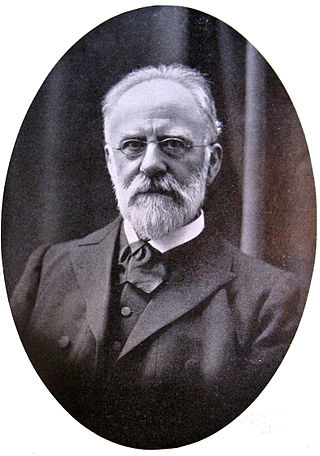
Emil Christian Hansen was a Danish mycologist and fermentation physiologist.

Ginger ale is a carbonated soft drink flavoured with ginger. It is consumed on its own or used as a mixer, often with spirit-based drinks. There are two main types of ginger ale. The golden style is credited to the Irish doctor Thomas Joseph Cantrell. The dry style, a paler drink with a much milder ginger flavour, was created by Canadian John McLaughlin.

Saccharomyces cerevisiae is a species of yeast. The species has been instrumental in winemaking, baking, and brewing since ancient times. It is believed to have been originally isolated from the skin of grapes. It is one of the most intensively studied eukaryotic model organisms in molecular and cell biology, much like Escherichia coli as the model bacterium. It is the microorganism behind the most common type of fermentation. S. cerevisiae cells are round to ovoid, 5–10 μm in diameter. It reproduces by budding.
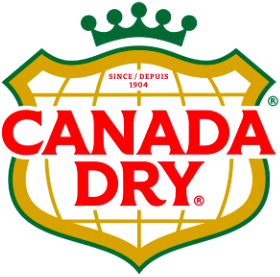
Canada Dry is a brand of soft drinks founded in 1904 and owned since 2008 by the American company Dr Pepper Snapple. For over 100 years, Canada Dry has been known mainly for its ginger ale, though the company also manufactures a number of other soft drinks and mixers. Although it originated in Canada, Canada Dry is now produced in many countries such as the United States, Panama, Mexico, Chile, Costa Rica, Japan, and in a number of countries of Europe and the Middle East.

Traditional ginger beer is a sweetened and carbonated, usually non-alcoholic beverage. Historically it was produced by the natural fermentation of prepared ginger spice, yeast and sugar.

Saccharomyces is a genus of fungi that includes many species of yeasts. Saccharomyces is from Greek σάκχαρον (sugar) and μύκης (fungus) and means sugar fungus. Many members of this genus are considered very important in food production where they are known as brewer's yeast, baker's yeast and sourdough starter among others. They are unicellular and saprotrophic fungi. One example is Saccharomyces cerevisiae, which is used in making bread, wine, and beer, and for human and animal health. Other members of this genus include the wild yeast Saccharomyces paradoxus that is the closest relative to S. cerevisiae, Saccharomyces bayanus, used in making wine, and Saccharomyces cerevisiaevar. boulardii, used in medicine.
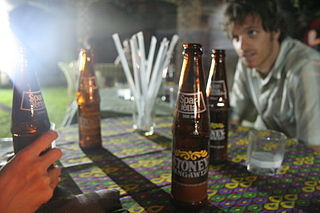
Stoney Ginger Beer, or Stoney Tangawizi as it is called in Swahili-speaking Africa, is a ginger beer soft-drink sold in several countries across the African continent. The product, sold in a brown bottle or can, is made and distributed by The Coca-Cola Company.

Tibicos, or water kefir, is a traditional fermented drink made with water and a symbiotic culture of bacteria and yeasts (SCOBY) held in a polysaccharide biofilm matrix created by the bacteria. It is sometimes consumed as an alternative to milk-based probiotic drinks or tea-cultured products such as kombucha. Water kefir is typically made as a probiotic homebrew beverage. The finished product, if bottled, will produce a carbonated beverage.

Monster Beverage Corporation is an American beverage company that manufactures energy drinks including Monster Energy, Relentless and Burn. The company was originally founded as Hansen's in 1935 in Southern California, originally selling juice products. The company renamed itself as Monster Beverage in 2012.

Bundaberg Brewed Drinks Pty Ltd is an Australian family-owned business that brews non-alcoholic beverages. Based in Bundaberg, Queensland, the company exports to over 61 countries across the globe and is most known for ginger beer and other carbonated beverages.

Preservation Island is a low and undulating granite and calcarenite island, with an area of 207 ha, in south-eastern Australia. It is part of Tasmania’s Preservation Island Group, lying in eastern Bass Strait south-west of Cape Barren Island in the Furneaux Group, and is an important historic site.
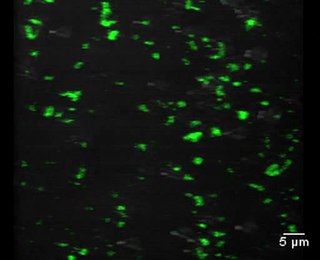
Saccharomyces boulardii is a tropical yeast first isolated from lychee and mangosteen fruit peel in 1923 by French scientist Henri Boulard. Although early reports claimed distinct taxonomic, metabolic, and genetic properties, S. boulardii is genetically a grouping of S. cerevisiae strains, sharing >99% genomic relatedness, giving the synonym S. cerevisiae var. boulardii.

Lager is a type of beer originated in Bavaria, which has been brewed and conditioned at low temperature. Lagers can be pale, amber, or dark. Pale lager is the most widely consumed and commercially available style of beer. The term "lager" comes from the German word for "storage", as the beer was stored before drinking, traditionally in the same cool caves in which it was fermented.
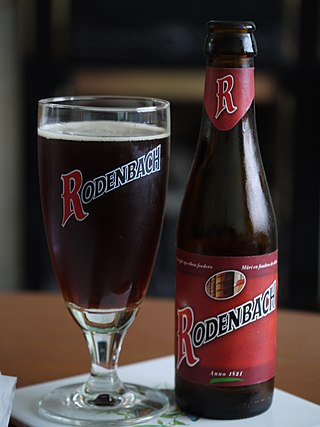
Flanders red ale or Flemish red-brown, is a style of sour ale brewed in West Flanders, Belgium.

American wild ale is a sour beer brewed in the United States using yeast or bacteria in addition to Saccharomyces cerevisiae for fermentation. Such beers are similar to Belgian Lambic and Oud bruin, and typically fermented using a strain of brettanomyces, resulting in a "funky" flavor.

Crabbie's is a Scottish brand traditionally known for its green ginger wine and blended whiskies produced at John Crabbie & Co's extensive premises in the Leith area of Edinburgh, Scotland. That company has changed its name and its business is unrelated to the original. The brands were bought by Halewood International Ltd and are presently best known for ginger beers manufactured at Halewood's plant in Liverpool. John Crabbie & Company (Wines) Limited was incorporated in May 2006 and changed its name to John Crabbie & Company Limited the following July.
Bees wine, also known as "beeswine", "bee wine" and by a variety of other local names, was a home-brewed "folk" alcoholic drink popular during the late 19th and early 20th century particularly in rural areas of the United States and United Kingdom. It was produced using the fermentation of sugar, treacle or molasses by a symbiotic culture of wild yeasts and bacteria.

















